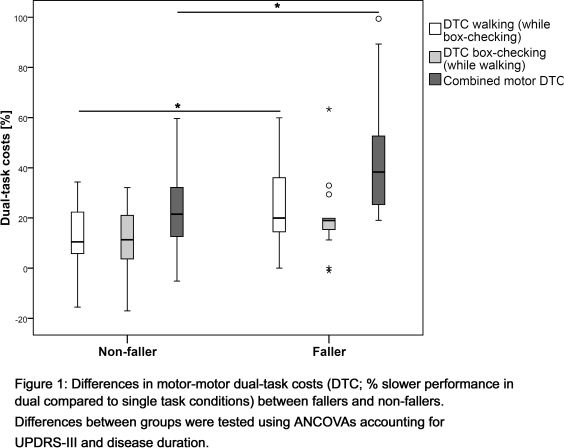Session Information
Date: Wednesday, June 22, 2016
Session Title: Parkinson's disease: Cognition
Session Time: 12:00pm-1:30pm
Location: Exhibit Hall located in Hall B, Level 2
Objective: To evaluate the predictive value of dual-task performance for future falls in patients with Parkinson’s disease (PD).
Background: Falls entail very severe health-related consequences in patients with Parkinson’s disease (PD). Cognitive impairment including dual-tasking deficits have been shown to contribute to an increased risk of falling in PD. However, specific types of motor-cognitive dual-tasking deficits that precede falls in PD are still unclear.
Methods: Walking speed during a concurrent box-checking or serial 7s subtraction task were assessed twice a year in 40 PD patients over a mean (±S.D.) observation period of 2.8±1.0 years. During this period, 14 patients reported a fall (4 excluded fallers already reported falls at baseline). Dual-task costs (DTC) 4.2±2.2 months before the first reported fall were compared to DTC of 22 patients who never reported falls. ROC analyses and logistic regressions accounting for DTC, UPDRS-III and disease duration were calculated to classify and predict fallers.
Results: Walking/box-checking dual-tasking, but not walking/subtracting, predicted fallers. Higher DTC for walking while box-checking in fallers (p=.029), but no significant difference for box-checking while walking (p=.178; combined motor DTC, p=.022) compared to non-fallers were observed. Fallers and non-fallers were classified based on combined motor DTC (area under curve: 0.75; 95% confidence interval, CI: .60-.91) with 71.4% sensitivity (95% CI: 41.9%-91.6%) and 77.3% specificity (54.6%-92.2%), which significantly predicted future fallers (p=.023). Here, an increase in combined motor DTC by 20.4%-points, which corresponds to the mean difference between fallers and non-fallers, was associated with a 2.6 (1.1-6.0) times higher odds to be a future faller. 
Conclusions: The simultaneous performance of two motor tasks is a valuable predictor of falls in PD. Falls in PD may be prevented by avoiding dual task situations as well as by specific motor dual-task training. These findings and their clinical and therapeutic relevance need to be further validated with various motor-motor dual-tasks in early stage PD patients.
To cite this abstract in AMA style:
S. Heinzel, M. Maechtel, S.E. Hasmann, M.A. Hobert, T. Heger, D. Berg, W. Maetzler. Fall prediction in Parkinson’s disease based on motor dual-tasking: Evidence from the prospective MODEP study [abstract]. Mov Disord. 2016; 31 (suppl 2). https://www.mdsabstracts.org/abstract/fall-prediction-in-parkinsons-disease-based-on-motor-dual-tasking-evidence-from-the-prospective-modep-study/. Accessed April 19, 2025.« Back to 2016 International Congress
MDS Abstracts - https://www.mdsabstracts.org/abstract/fall-prediction-in-parkinsons-disease-based-on-motor-dual-tasking-evidence-from-the-prospective-modep-study/
